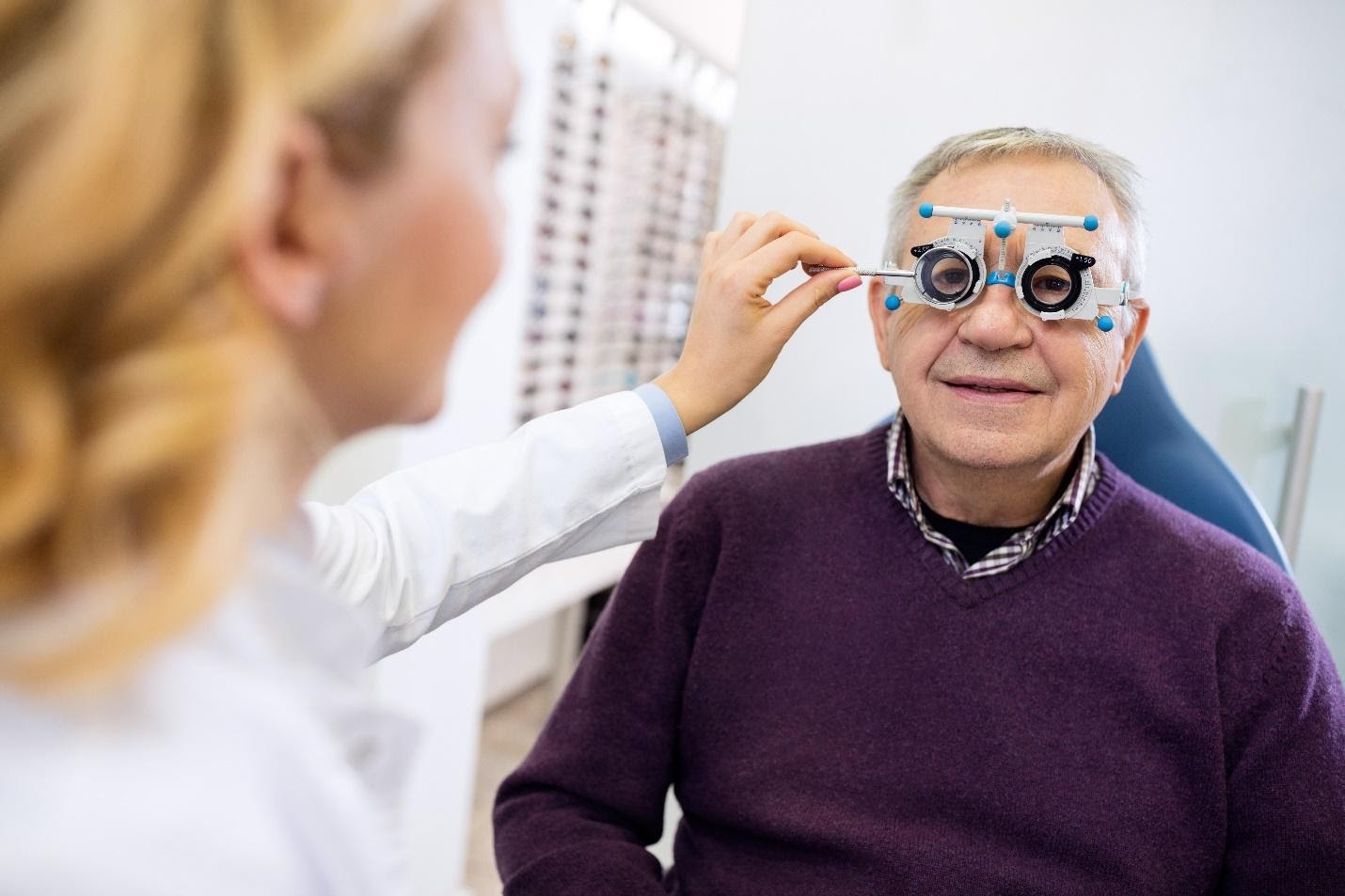
Common Vision Conditions in Seniors
Vision changes are common with age, but that doesn’t mean you can’t take precautions to maintain healthy vision. One of the first steps to keeping up with your vision health is to educate yourself about the types of vision conditions most common among seniors.
Glaucoma
Glaucoma is one of the leading causes of blindness in seniors. It refers to a group of conditions that cause damage to the optic nerve. If too much fluid builds up behind the eye and can’t properly drain, it causes optic nerve damage. When the optic nerve gets damaged, it causes blind spots to develop. Additional symptoms include severe headache, eye pain, nausea, blurred vision, and eye redness. Glaucoma is most common in those aged 60 and older and those with a family history of glaucoma.
Cataracts
Cataracts are when the eyes’ lens gets cloudy and causes the vision to appear foggy. The eye lens is responsible for focusing light that passes through the eye. As you age, that lens loses its flexibility and transparency, which can cause a cataract to develop.
Cataracts develop slowly and don’t disturb vision right away. In the early stages of cataracts, most doctors prescribe eyeglasses to clear up your vision. However, if cataracts make it too difficult to see, your doctor may suggest cataract surgery. In addition to cloudy vision, cataracts can also cause impaired night vision, fading colors, or double vision in a single eye.
Dry Eye
If your eyes don’t produce tears to keep the eyes lubricated, it can cause dry eyes. There are a few causes of dry eye, but one of the most common is an unhealthy tear film. The tear film has three layers that work to keep the eye lubricated and clear. If any of these three layers get damaged, it causes a dry eye. Tear film can cause dysfunction due to hormone changes, an inflamed eyelid gland, allergies, or eye disease.
Dry eye symptoms include burning, stinging, sensitivity to light, redness, blurred vision, or eye fatigue. It’s most common in older adults after the age of 50. It’s also more prone to develop in women and those who wear contact lenses.
Floaters
If you’ve ever noticed black or gray spots in your vision, those are floaters. An age-related change in the eye causes most floaters. There is a jelly-like substance in your eyeball that gives the eye its round shape. As you age, the substance can begin to liquefy and pull away from the surface of the eyeball. The pieces that pull away cast shadows in your vision because they block light from passing through the eye. Other causes of floaters include inflammation, bleeding in the eye, a torn retina, or particular eye medications.
Presbyopia
Presbyopia is the inability to focus on nearby objects. Most people tend to start developing presbyopia in their 40s, and it gradually worsens with age. As you age, eye lens hardens and loses flexibility. When that happens, it makes it harder for the eye to focus on close-up objects.
Most doctors can diagnose presbyopia with a simple eye exam. If you do have presbyopia, the most common course of action is prescription glasses. If your vision gets too bad, your doctor may suggest surgery.
Epiphora
Epiphora means tearing or watery eyes. The eye naturally produces tears to keep the eye lubricated and comfortable. However, sometimes eyes have too many tears, which not only causes the eye to be more lubricated, it can also cause redness, soreness, pain, swelling, blurred vision, and light sensitivity.
There are a few different causes of epiphora. If something, like dirt or pollen, gets into your eye, it triggers the eye to blink vigorously and create more tears in an attempt to wash the foreign object out. Allergies can also cause epiphora. If allergies are the culprit, dust or pet dander can irritate the eyes, causing your immune system to react with an inflammatory response.
In most cases, epiphora will clear up on its own. However, if you’re experiencing severe or prolonged symptoms, you should talk to your doctor about treatments. Depending on the cause, they may suggest eye drops, steroids, or other medications.
How Visiting Angels Can Help
If you or an aging loved one is living with a vision condition that impairs their ability to live independently, the Visiting Angels St Louis Park, MN team can help. Our caregivers assist seniors with non-medical tasks such as meal preparations, light housekeeping, personal grooming, mobility, transportation, medication reminders, and more. Our St Louis Park office serves those in Minneapolis, St Louis Park, Golden Valley, Richfield, and the West Metro area. If you’d like to learn more about our services and schedule a free consultation, you can complete this online form or give us a call at 952.935.0789.
